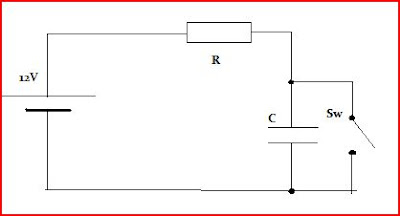

For this experiment i had to build a circuit with 2 different capacitors rated at 100 uF and 330 uF, and 3 different resistors at 100 ohms, 470 ohms and 1K. Then I calculated the time the capacitor would reach full charge by using the formula T (Time) = R (Resistance) x C (Capacitance) x 5 (Number of Steps).
My first test was with the 100uF capacitor and 1K resistor. I calculated the amount of time for the capacitor to fully charge by using the formula T=RxCx5. (1 x 100 x 5) = 500ms to fully charge. Then using the oscilloscope I measured the actual time it took the capacitor to fully charge using the 200ms per division setting.

My next test was using the same 100 uF capacitor, but replacing the 1K for a 100R. 0.1 x 100 x 50ms to fully charge. Using the oscilloscope at the slowest pace possible (200ms per diversion,) I could only estimate the amount of time it took, because the capacitor fully charged before I had time to measure anything, so I just recorded my calculation of 50ms.

Next was the 100uF and 470R. 0.47 x 100 x 5 = 235ms. Measuring with the oscilloscope I recorded 200ms.
Now using a bigger capacitor (330uF) and replacing the 470R with a 1K I calculated the time this capacitor would fully charge. 1 x 330 x 5 = 1650ms.  Then using the oscilloscope I meausered a time of 1800ms to fully charge.
Then using the oscilloscope I meausered a time of 1800ms to fully charge.
Changes with the resistor size will effect the charging time by restricting more current or not restricting as much current. The bigger the resistor, the longer time it will take for the capacitor to charge because of the increased resistance. The smaller the resistor, the less time it will take to charge the capacitor from the decreased resistance.
Changes in the capacitor size will effect the charging time. If a bigger capacitor is used, the longer the time it will take to fully charge would increase. A smaller capacitor will take less time to fully charge.
No comments:
Post a Comment